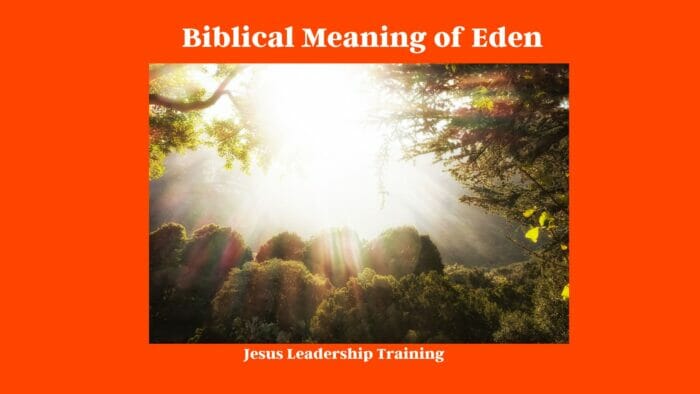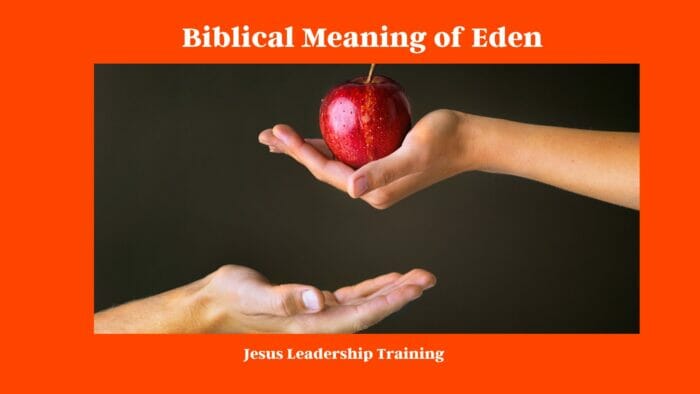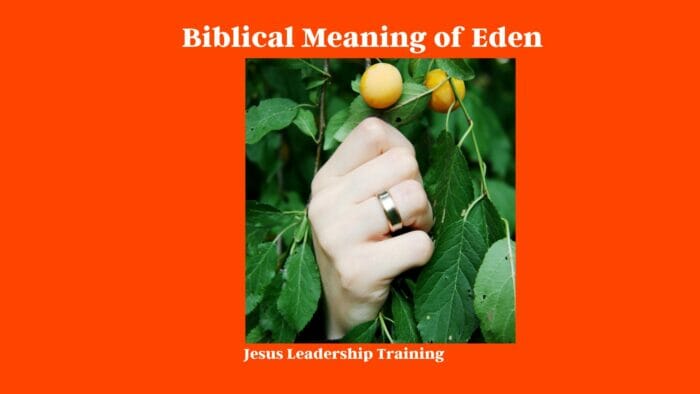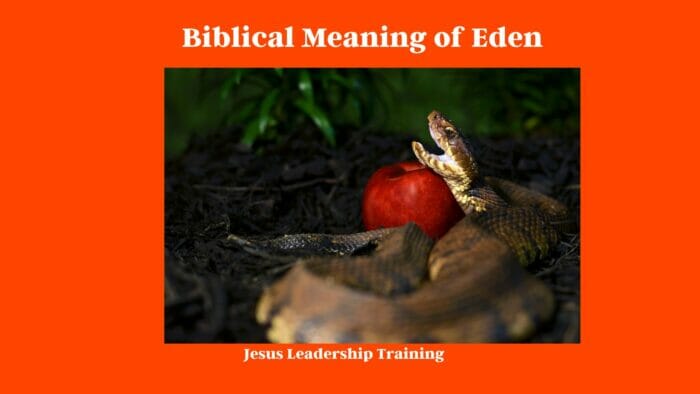Biblical Meaning of Eden = Welcome to a captivating journey that will transport you back to the beginning of time, where a pristine paradise known as Eden existed. In this article, we will delve into the biblical meaning of Eden, unearthing its profound significance and unraveling the mysteries that surround this heavenly garden. Join us as we explore the divine symbolism, spiritual lessons, and profound insights that lie within the story of Eden.
Table of Contents
Biblical Meaning of Eden | Unveiling God’s Perfect Garden
The biblical meaning of Eden holds a wealth of spiritual insights and symbolic depth. Let’s embark on our exploration and discover the wonders hidden within God’s perfect garden.
The Origins of Eden: A Garden Fit for Humanity’s Birth
In the biblical narrative, Eden represents the idyllic dwelling place created by God for humanity’s birth. This paradise, described as a garden, symbolizes the harmonious relationship between God, nature, and humanity. Within its lush landscapes, pristine rivers, and bountiful trees, Eden embodies the perfect setting for the first human beings, Adam and Eve, to thrive.
here’s a table providing facts about the Garden of Eden according to the Bible:
| Facts about the Garden of Eden | Description |
|---|---|
| Location | The Bible does not provide a specific geographical location for the Garden of Eden, but it mentions a river flowing out of it that divides into four headwaters, named the Pishon, Gihon, Tigris, and Euphrates (Genesis 2:10-14). |
| Creation | According to Genesis 2:8-9, God planted the Garden of Eden and placed the man He had formed into it. |
| Inhabitants | The first human beings, Adam and Eve, lived in the Garden of Eden (Genesis 2:15). |
| Tree of Life | The Tree of Life, whose fruit gives eternal life, was in the middle of the garden (Genesis 2:9, 3:22). |
| Tree of the Knowledge of Good and Evil | This tree was also in the middle of the garden. God commanded Adam and Eve not to eat from this tree (Genesis 2:16-17, 3:3). |
| Expulsion | After Adam and Eve ate from the Tree of the Knowledge of Good and Evil, they were expelled from the Garden of Eden (Genesis 3:23-24). |
| Cherubim Guard | After Adam and Eve’s expulsion, God placed cherubim and a flaming sword flashing back and forth to guard the way to the Tree of Life (Genesis 3:24). |
It’s important to note that interpretations of the Garden of Eden vary widely among theologians and biblical scholars. Some view the account literally, believing that the Garden was a physical place on earth. Others interpret the account symbolically or metaphorically, viewing the Garden as a representation of a spiritual truth.

Divine Proximity: Communion Between God and Humanity
One of the central aspects of the biblical meaning of Eden is the intimate relationship between God and humanity. The garden serves as a sacred meeting place, where God dwells in close communion with His creation. This divine proximity exemplifies the profound desire of the Creator to engage and connect with His beloved children.
Abundance and Provision: A Garden Overflowing with Blessings
Eden also signifies a place of abundance and provision. The garden is described as teeming with an abundance of fruit-bearing trees and an array of vibrant flora and fauna. This depiction highlights God’s generous nature, reflecting His desire to bless and provide for His creation abundantly.
Innocence and Purity: The Pristine State of Adam and Eve
Within the biblical meaning of Eden, we encounter the concept of innocence and purity. Before succumbing to temptation, Adam and Eve dwelt in a state of sinlessness and moral purity. Their existence in Eden mirrors the perfect harmony and righteousness that humanity was created to embody.

Paradise Lost: The Fall from Grace
Regrettably, the biblical narrative also reveals the tragic event that led to humanity’s expulsion from Eden. This pivotal moment, known as the Fall, altered the course of human history, introducing sin, suffering, and separation from God. The story of Eden serves as a cautionary tale, emphasizing the consequences of disobedience and the importance of maintaining a close relationship with God.
Unveiling the Cherubim: Guardians of the Divine Presence
As Adam and Eve were banished from Eden, God stationed cherubim, angelic beings, to guard the entrance to the garden. These celestial guardians symbolize the separation between humanity and the divine presence. They stand as a reminder of the need for spiritual restoration and the longing for humanity to once again find its way back to the divine dwelling place.
We often hear the word “Eden” referenced in our religious contexts, yet few of us truly understand what it means. The term “Eden” is derived from the Hebrew word “Eden” meaning “pleasure” or “delight”. This is the same name given by God to the Garden of Eden, the place where Adam and Eve were placed after being created. To understand the deeper meaning of Eden, we must explore the Biblical definition, the Hebrew roots, the location in the Bible, and the spiritual implications of the word.

Examining the Hebrew Roots of the Name Eden (Bible Dictionary)
The Hebrew word “Eden” (עֵדֶן) is derived from the root word for joy (עָדַן) which is found in the Bible in Proverbs 8:31. This root word carries the idea of delight, joy, and pleasure. Therefore, “Eden” can be understood to mean “delight”. Interestingly, the word “Eden” is used several times in the Bible in the context of describing God’s pleasure or delight in different people or things. For example, in Psalm 16:3, David says “As for the saints who are on the earth, they are the excellent ones, in whom is all my delight.”
When was Eden Mentioned in the Bible?
The Garden of Eden is first mentioned in the book of Genesis, Chapter 2. In this passage, God creates the Garden of Eden and places Adam and Eve in it. It is also mentioned in Genesis 3, where Adam and Eve are expelled from the Garden after they eat from the forbidden fruit. This is the last time Eden is mentioned in the Bible.
Investigating the Location of Eden in Scripture
The exact location of the Garden of Eden is not specified in the Bible. In fact, there have been many debates and theories as to where Eden may have been located. Some theories suggest that it was located somewhere in the Middle East, while others speculate that it may have been in the Indian subcontinent. Regardless of its location, the Garden of Eden is described in the Bible as a paradise, full of abundance and beauty.
Uncovering the Spiritual Meaning of Eden
The spiritual meaning of Eden is often interpreted as a symbol of the kingdom of God. It is seen as a place of perfect peace, love, and joy, a place where the presence of God is felt and experienced. It also represents God’s perfect plan for humanity, a place where humans can live in harmony with God and with one another.
Investigating the Biblical Names of Eden
The Garden of Eden is referred to by several different names in the Bible. In Genesis 2:8-10, it is referred to as the Garden of Eden, and in the New Testament, it is referred to as Paradise. In Isaiah 51:3, it is referred to as the Garden of God, and in Ezekiel 28:13, it is called the Garden of Delight.
Exploring the Biblical Dictionary Definition of Eden
According to Strong’s Concordance, the Hebrew word “Eden” (עֵדֶן) is defined as “pleasure, delight, or paradise”. The word Eden is derived from the root word for joy (עָדַן), and therefore carries the idea of a place of joy, pleasure, and delight.
Examining the Genesis Account of Eden
The Genesis account of Eden describes it as a beautiful garden with two special trees, the Tree of Life and the Tree of the Knowledge of Good and Evil. God places Adam and Eve in the Garden and gives them instructions not to eat from the Tree of the Knowledge of Good and Evil. When they do, they are cast out of the Garden and barred from re-entering.
Answering the Question: What is the Biblical Meaning of Eden?
The Biblical meaning of Eden can be summed up as a place of perfect peace, love, and joy, a place where the presence of God is felt and experienced. It also symbolizes God’s perfect plan for humanity, a place where humans can live in harmony with God and with one another. Ultimately, Eden is a reminder of our need to seek and find a deeper relationship with God and to strive for a life of holiness and love.
FAQs about the Biblical Meaning of Eden
- Q: What does the biblical term “Eden” mean? A: The term “Eden” translates to “delight” or “pleasure” and represents a place of paradise and bliss.
- Q: Does Eden hold any significance in other religious traditions? A: While the concept of a paradise-like garden exists in various religious traditions, the biblical narrative of Eden is unique to Christianity and Judaism.
- **Q: What lessons can we learn from
Q: What lessons can we learn from the story of Eden? A: The story of Eden teaches us important lessons about obedience, the consequences of sin, the value of intimacy with God, and the longing for restoration and redemption.
- Q: Is the story of Eden meant to be taken literally or symbolically? A: The story of Eden contains both literal and symbolic elements. While it describes real events, it also carries deep spiritual and symbolic meaning that transcends a purely historical interpretation.
- Q: Does the concept of Eden hold any relevance for believers today? A: Absolutely. The story of Eden reminds believers of the original design for humanity—a life in close relationship with God, in harmony with nature, and free from the bondage of sin. It encourages us to pursue spiritual restoration and seek a renewed connection with our Creator.
- Q: Can we ever regain the paradise-like state of Eden? A: While we cannot return to the physical garden of Eden, through faith in Jesus Christ, believers can experience a spiritual restoration and the hope of a future paradise in the presence of God.
Other Terms
biblical earthly paradise inhabited by the first created man and woman
created and embellished by god especially for the first humans
eden meaning
smith bible
easton bible
encyclopaedia britannica
citation style
hitchcock bible
style britannica
hebrew word
land eden
dictionary
names
tree
bible dictionary
river
genesis
site
euphrates
Final Thoughts: Rediscovering the Profound Significance of Eden
As we conclude our exploration of the biblical meaning of Eden, we are left with a sense of awe and wonder at the depth of its symbolism and the profound lessons it imparts. Eden represents the perfect dwelling place where humanity existed in harmony with God, nature, and one another. It serves as a reminder of our longing for divine communion, the consequences of sin, and the need for redemption and restoration.
In today’s world, where chaos and brokenness often prevail, the story of Eden beckons us to seek a deeper connection with our Creator, to embrace His provision and abundance, and to live in obedience and intimacy with Him. While we may never physically return to the garden, the spiritual truths and lessons it offers remain timeless and relevant, guiding us towards a life of purpose, righteousness, and hope.
So, let us embark on our own journey of rediscovery, reflecting on the biblical meaning of Eden and allowing its wisdom to shape our lives. May we walk in the footsteps of Adam and Eve, learning from their triumphs and failures, and finding solace in the promise of a future paradise, where we will once again dwell in the presence of our loving Creator.




